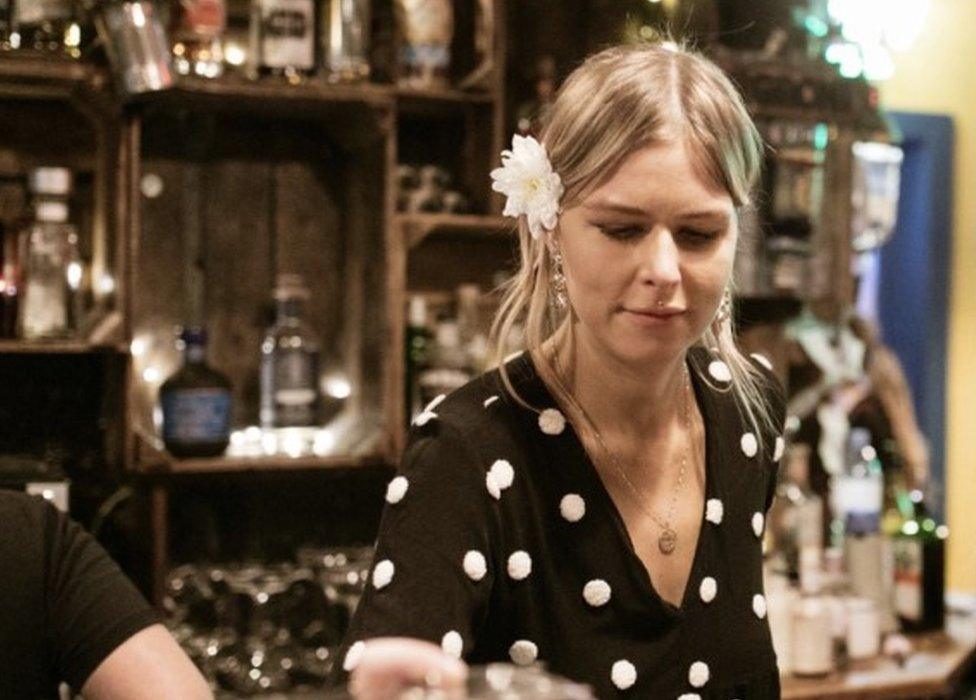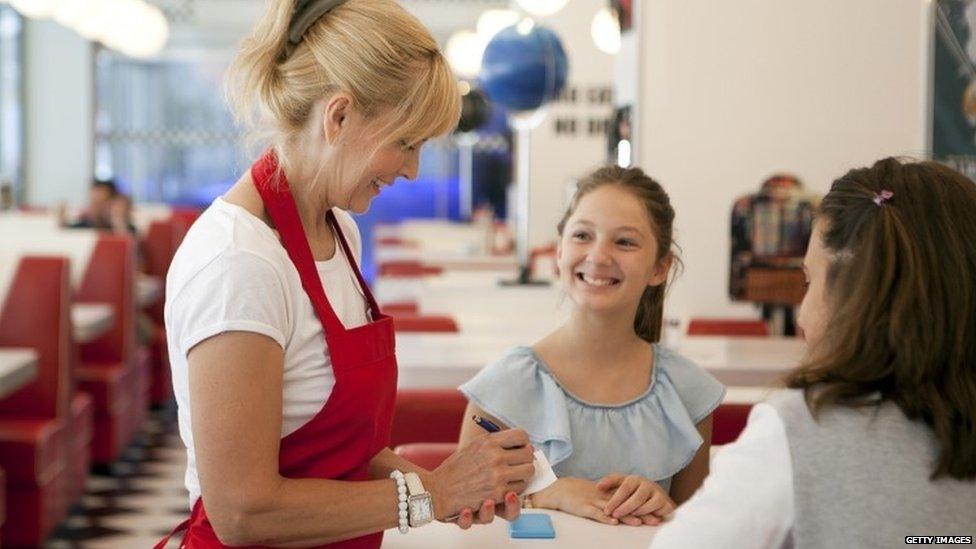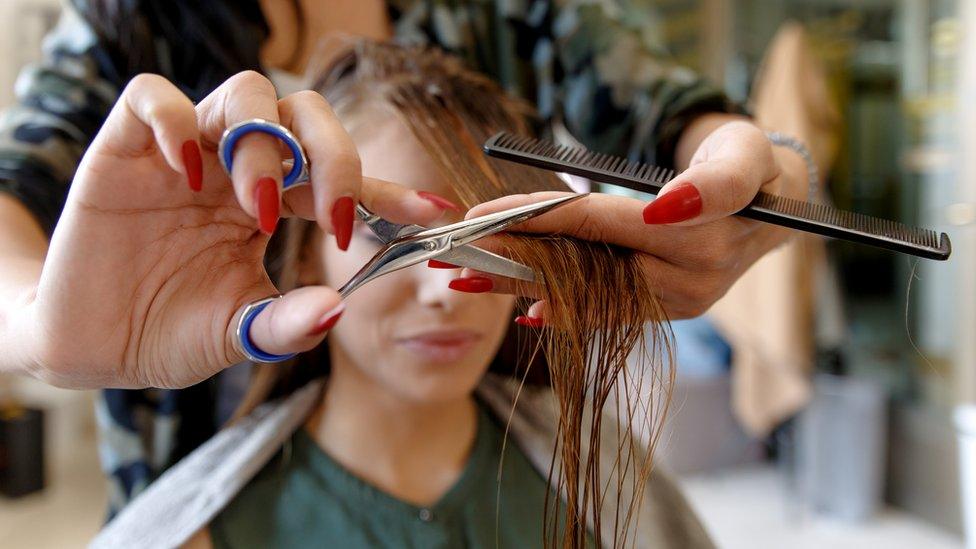Tipping laws: '100% of service tips should go to staff'
- Published

Workers in the Republic of Ireland are set to have a legal right to their tips on 1 December
"If a tip is left for service, you would expect 100% of it goes to the staff."
These are the words of a union representative amid calls to increase laws around the protection of tips in Northern Ireland.
This is because Northern Ireland is set to be out of step with the rest of the UK and the Republic of Ireland on the issue.
A new law in Ireland, which comes into force on 1 December, gives employees a legal entitlement to get the "service charge" paid in electronic form.
A Westminster bill, which will apply to the rest of the UK and aims to give workers a legal right to their tips, is passing through the Commons., external
As employment law is a devolved matter the bill will not extend to Northern Ireland.
The Department for the Economy in Northern Ireland said it had explored whether similar measures could be introduced in Northern Ireland.
A spokesman added that any proposals would be subject to public consultation and require the passing of primary legislation in Northern Ireland.
An executive has not been in place at Stormont since February when the Democratic Unionist Party withdrew from the first minister's position as part of an ongoing protest against the Northern Ireland Protocol.
'Tipping is the tip of the iceberg'
Amy Ferguson, 25, from Belfast has worked in hospitality since she was at school.
She is a barista in Omagh in County Tyrone and gets 100% of her tips.
But, in the past, she has had tip money deducted.

Amy Ferguson says it should be the people who get the tips "dishing them out as they see fit"
"I worked in a cafe. They could afford to pay for their own milk supplies, but they were taking it out of the tips which customers gave to us," she said.
"The minimum wage is what the bulk of hospitality workers are on so in that context getting tips can become incredibly important," she said.
"Covid was especially difficult and our industry spent a good portion of it living on 80% of minimum wage."
She said she had particularly relied on tips when she was a bartender in Belfast and paid a high rent, adding that a late taxi home could cost two hours wages.
"That means you can be really reliant on tips to be able to get home from work safely," she added.
There are other challenges, according to Amy.
She said on one occasion when she was a bartender in Belfast, she and her other female co-workers were inappropriately touched and subjected to inappropriate comments.
"When we asked them to stop they were saying stuff like: 'Oh, well, you need my tips, don't you?'" she said.
'Simply to ask them'
Neil Moore from Unite the Union said that while the UK Bill was a positive step forward it still contained "loopholes".
He said Unite wanted to see more detail on the bill, it should be retrospective and said there had been a lack of consultation with workers and workers' organizations.
Having worked in hospitality for more than a decade, and experienced issues with not getting tips , he said any bill that was introduced should address the other challenges faced by hospitality workers which relate to tipping.
These include free transport home if they are working after 23:00, he said.
He also said members were highlighting the issue of the cost of living and sexual harassment.

Paying tips by card is becoming more common
He said among the positives about the Westminster bill was that it ensured tips would be paid more fairly, included agency workers and a tips policy in writing.
"We would still advise the public that the best way to ensure your tip goes to the worker is simply to ask them," he added.
Important sector
Rebecca McCloskey from Belfast, has been working in hospitality for 14 years.
The 29-year-old works in restaurant in Belfast city centre, where she gets 100% of her tips. Her employer also pays for her taxi home.

"Before Covid tips were better. I think many assume that staff are all getting a good wage - but not everyone is" says Rebecca
"Most people I know in the industry do get their tips but in the past I have heard from those who haven't seen their tips - even though they know the customer left them money," she said.
With that in mind, Rebecca said she would like to see more legal protection across hospitality and extra protection for staff getting home.
"I think something should be in place for those working after 11," she said.
"We also need an active government and laws being passed to protect such an important sector in the city - hospitality is one of the busiest and makes so much money for Belfast and Northern Ireland," she added.
Colin Neill from Hospitality Ulster said his organisation would have no objection to legislation but that "thankfully, generally, employers keeping tips is not an issue here".
He added: "If there are people being impacted everyone should get their tips."
Hospitality Ulster has provided guidance for tips so that employers in Northern Ireland can ensure tipping is fair.

The guidance covers cash tips given to an individual employee, or non-cash tips, being additions to the amount on the bill and paid to the restaurant.
There have been some moves in the sector.
In 2015 restaurant chain Pizza Express announced it would stop deducting an 8% administration fee from staff tips made by card following pressure from unions and staff.
In November, hotel workers in Scotland's Cameron House won a battle to secure £138,000 in withheld tips.
During the summer Social Democratic and Labour Party MP Claire Hanna wrote to then Economy Minister Gordon Lyons asking for similar legislation to the Westminster bill to be put in place in Northern Ireland.
In August, she told Radio Ulster while most businesses in Northern Ireland were being fair with tips, she had heard of some instances where that was not the case.
"This piece of legislation would regulate that," she said.
For Amy Ferguson, the upcoming new UK law is a tentative step forward.
"To actually have transparency in tipping procedures and a standard procedure that people can, understand their rights, and if they're being short changed," she said.
- Published15 October 2019

- Published15 October 2019
